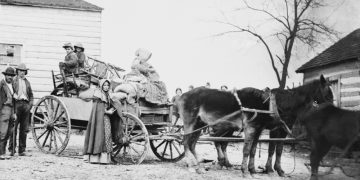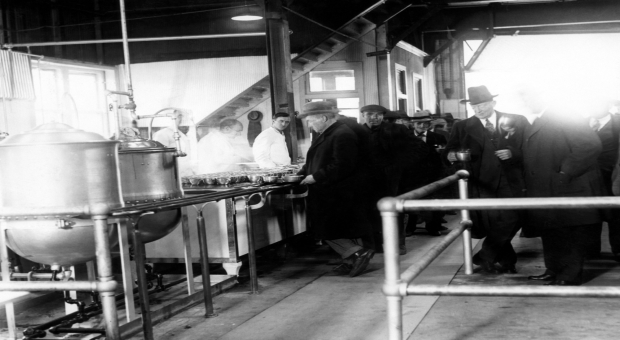History is full of lessons, if you’re willing to look for them.
By studying the past, you can find principles that you can incorporate today. In this post, we’re going to look at seven key health lessons you can learn from the Great Depression.
1. Grow Your Own Food
To combat the rising cost of food, many families grew their own food during these tumultuous years. By taking personal responsibility to produce their food, families knew there would be something on the table.
Gardens sprung up across the landscape, from the country to the cities. People planted in pots, in vacant lots, and in their yards. Many converted as much outdoor space as they could to grow food.
This food was then used to feed people all year round. Housewives put up the harvest, proudly displaying the jars of food that’d get their family through the winter.
Produce wasn’t the only type of food keeping folks alive during the Great Depression. Backyard flocks of chickens were common, even in town. People with chickens and cows were considered wealthy, because they had a consistent supply of fresh food.
Health Lesson for Today:
Growing your own food gives you maximum control over what you eat. You don’t have to worry about unpronounceable ingredients or the latest e-coli outbreak.
You also have a source of food to keep you going if the economy collapses. The mental knowledge that this gives you can’t be overlooked.
2. Eat Real Food
Speaking of food, the diet during the Great Depression looked nothing like today’s American diet. Many processed foods that are consumed today did not exist during the Great Depression. Instead, almost everyone ate real, minimally processed food.
Since food was scarce, people used it wisely. When they butchered a chicken, the people used every part of that bird.
They simmered the carcass and feet to make a nutritious stock. Livers were fried. The meat was cooked and divided among several simple meals.
Leftovers and scraps were turned into Depression Soup. Food waste was minimized, and families tried to get the maximum amount of nutrients possible.
Health Lesson for Today:
There’s something to be said for eating simple, real foods that aren’t produced in a factory. Your body doesn’t need processed junk.
What Survival Secret We Lost To History
Instead, stick to foods that fuel your body with nutrients. You won’t need to eat as much to feel full, and your body will have the nutrition it needs.
3. Move Your Body
With the focus on survival, people weren’t sedentary during the depression years. Everyone in the family pitched in to help, which meant they got up and moved frequently.
People took on odd-jobs for extra money. They swept sidewalks and scrubbed laundry. They gathered wood and chopped it to sell as firewood.
Cleaning houses and cooking food required work. There weren’t as many automatic gadgets as there are today. Nearly everything was done by hand, and required a fair amount of standing, stooping, bending, and twisting.
Movement happened naturally throughout the day. Often from sunup to sunset, people were actively engaged in physical activity. And this movement helped everyone stay trim, no gym membership required.
Health Lesson for Today:
Get up and move. Your body isn’t meant to sit down all day. Physical movement is good for almost everyone.
Need some ideas on ways to incorporate more natural movements? Try these three things:
- Starting a garden (your plants will need caring for.)
- Getting a dog (they’ll need walking throughout the day.)
- Clean the house (you won’t just get movement with this one, you’ll get a clean house!)
4. Practice Contentment and Gratefulness
Being healthy isn’t just about your physical body. It also concerns your mind and emotional well-being.
Imagine waking up one morning and discovering that nearly everything you worked for was suddenly gone. The banks closed and you couldn’t get your money. Your company shut down and you lost your job.
And without an income, you couldn’t pay your mortgage, so you need to leave your home.
These situations all happened regularly during the Great Depression. It was a time when nearly everyone had something to gripe about.
Yet, many people didn’t take time to sit and whine. They took stock of the situation and learned to be content with the little that they did have.
My grandparents talked frequently of the sense of community that abounded during this time. Though they grew up in different parts of the Pacific Northwest, they both shared memories of the way their communities worked together.
They told many stories about the different people who found refuge in their family barns. Many people willingly opened whatever space they did have, to offer shelter to the homeless.
They shared what little food they had generously. By using ingenuity and innovation, they were able to stretch their food in incredible ways.
And though they had little, everyone was thankful for what they did have.
Health Lesson for today:
Be mindful of your mental outlook. Your mental health truly is important, and it can impact your physical health immensely.
Look for opportunities to practice contentment and gratefulness. Focusing on what you do have, instead of what you don’t, can help keep you from feeling low.
5. Know How to Treat Illnesses and Injuries
During the Great Depression, people couldn’t afford to go running to the doctor every time they got sick or had a minor injury. Instead, home remedies abounded.
Almost everyone knew the benefits of medicinal herbs, and even children were taught to forage them. These herbs were dried, and concocted into a variety of salves, tinctures, and teas.
This Timeless Collection of Forgotten Wisdom Will Help You Survive!
By taking the time to prepare these items, people were ready when the treatments were needed. Many common illnesses, like colds, constipation, and headaches, could be successfully resolved at home.
Health Lesson for Today:
Today, pharmaceuticals have taken over home remedies. Very few people know how to locate medicinal herbs, and even fewer know how to use them.
So much knowledge has been lost, in a relatively short amount of time.
But your health may depend on this knowledge. Take time to learn about the plants growing around you, and how you can use them.
Take baby steps to help you learn how to properly treat minor problems. Use dried herbs to make a tea. Create a tincture.
Invest your time in learning these skills now. Practice treating a cough with honey, or an upset stomach with a warm mug of peppermint tea.
Can You Think of Any Other Health Lessons from the Great Depression?
People still got sick during the Great Depression. Many died from malnutrition or starvation. Others were so emotionally impacted that they committed suicide. It was a hard time.
Yet, despite the challenges, there were many survivors. Many who came out of the depression stronger than they had been before. The five things above played a key role in their ability to physically survive during dire circumstances.
Can you think of any other health lessons we can pull from the Great Depression? I’d love for you to share them in the comments below.























































































Good article. Many truths.
My late husbands parents and grandparents and my parents and grandparents survived that time. They told many stories of those times. Tough times and many folks helped each other as they could. Some of my mother in laws aunts and their families ended up living along a rural creek with several other families that had all lost their homes. They grew a bit of food there near the water. All lived in half dougouts with tarps over for protection from the weather. Everyone helped dig and cook, carry water from the creek gather wood or whatever they could do. You told it well.
the lesson i learned from my dad was that pretty much everything had value. we saved a lot of stuff and made or upcycled into other useful items. he also taught me to try to fix anything, you can not make it more broke(although i sometimes reduce the object to copper, other metals). have a pretty good success ratio of fix to salvage.